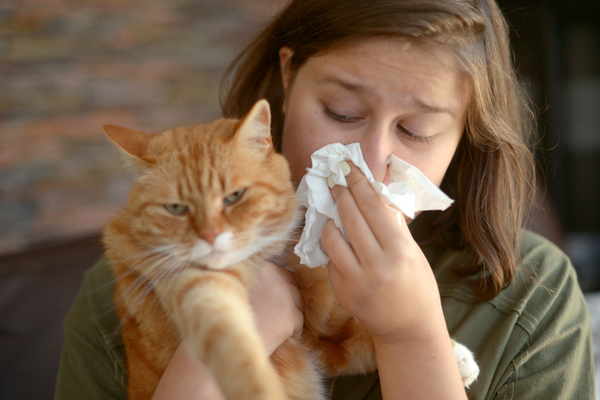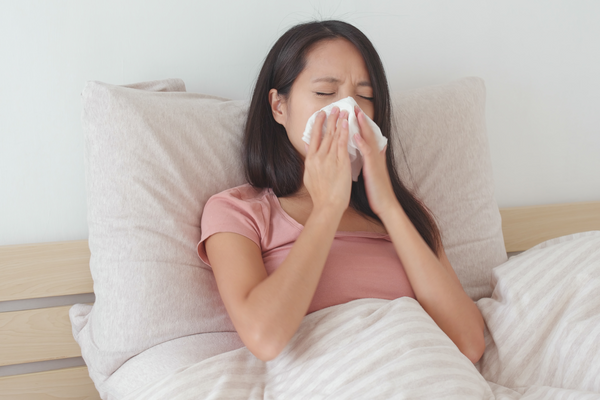Is Your Household Cleaning Routine Causing Contact Dermatitis?

Mopping the floor, scrubbing the bathtub, and cleaning the kitchen aren’t activities most people would think of as fun. But for some, cleaning the house is extremely irritating. Literally. We’re talking about contact dermatitis, a common condition that makes skin red or inflamed after contact with a substance. Many of the products that we use to keep our homes clean can be rough on the skin. There have been numerous studies on the subject, some with dramatic findings. For example, one study found that 81% of professional cleaners suffered from some form of contact dermatitis as a result of their occupation. Of course, there’s no cure for household chores, but by identifying and avoiding the cleaning chemicals that irritate your skin, you’ll at least be able to reduce your irritation while cleaning. Well, your skin irritation anyway.
Allergic vs. Irritant Contact Dermatitis
To get to the bottom of your contact dermatitis, you’ll first need to figure out what kind of reaction you’re having. If you’re not sure, it’s best to consult with your allergist or dermatologist. That said, most household products result in skin irritation, not allergic reactions. Allergic contact dermatitis comes from a specific allergy to a substance. This could be an allergic reaction to an ingredient, like fragrance chemicals, essential oils, or a particular plant extract in cleaning products.
Related: Sensitive to Fragrance? You’re Not Alone
The majority of people who experience contact dermatitis are dealing with a skin rash known as “irritant contact dermatitis.” Irritant contact dermatitis comes from exposure to a product that could irritate anyone’s skin. You’re not specifically allergic to the product, but the harsh chemicals that the product contains can strip away your skin’s natural oils, leaving it red, itchy, inflamed, and generally uncomfortable. Some people may be more sensitive to certain ingredients than others.
Determining whether contact dermatitis is caused by an irritant or an allergen can be difficult as they often result in similar symptoms, which can range from mild to severe depending on how sensitive you are to the substance. Some symptoms may include:
- Itching, which may be severe
- A red rash
- Sun sensitivity
- Warm or hot to the touch skin
- Redness and swelling
- Itchy blisters or bumps, sometimes with oozing and crusting
- Peeling or cracking of the skin
- Swelling, especially in the eyes, face, or groin areas
Contact dermatitis isn’t life-threatening or contagious, but it can be very uncomfortable. When someone comes into contact with the irritant or allergen, they usually experience skin irritation within minutes or hours, but they may not experience symptoms for up to 10 days after. However, with each reintroduction to the offending substances, the symptoms may appear more quickly and can be more severe. The length of time in which the skin is in contact with the offending irritant or allergen can also increase the severity of the reaction.
How Common is Contact Dermatitis?
If 200-230 million people globally are diagnosed with non-specific dermatitis each year, around 40% of these will be due to contact dermatitis. Within these cases of contact dermatitis, roughly 80% will be irritant contact dermatitis – allergic contact dermatitis is much less common. According to the Royal College of Physicians (RCP), “Contact dermatitis affects more women than men, and the occupations with the highest risk are cleaning, cookery, hairdressing, and healthcare.”
The prevalence of hand dermatitis among professional cleaners has been shown to be between 10-28%, and up to 36% in those that regularly use products containing hydrochloric acid (commonly found in bathroom cleaning products).
What’s Making Your Skin Break Out?
There is a multitude of household products that can cause contact dermatitis. Here are a few of the usual suspects:
Laundry Detergents & Fabric Softeners
Laundry products are one of the most common culprits of irritated skin. And for a good reason! Our clothes and linens are in constant close contact with our skin – and if your laundry products contain something your skin doesn’t agree with, you’ll likely find out in the form of a rash. Many traditional detergents on the market today have a number of harsh ingredients, like artificial fragrances, synthetic dyes, and a long list of toxic chemicals (like 1,4-dioxane, a potential carcinogen), all of which can aggravate the skin and cause a variety of issues in both adults and children. This rings especially true for those who have a history of skin irritation or sensitivity.
If you're prone to skin irritation, you should always steer clear of laundry detergents that contain irritants like dyes, fragrances, and other harsh chemicals at all costs and instead switch to a hypoallergenic detergent that was formulated with your sensitive skin in mind. Our allergist and dermatologist recommended laundry detergent will leave you with a clean that feels good. It will leave nothing behind and won’t irritate sensitive skin. Over the years, we’ve had many loyal customers with allergies and chemical sensitivities who share their joy in finding a hypoallergenic detergent that is gentle on the skin yet effective on dirty laundry.
Soaps & Detergents
Another common culprit of irritated skin? Soap. Many of us wash our hands too often. Yes, washing your hands is the number one way to prevent disease, but your hands aren’t always contaminated. If they’re not (for example, when chopping fruits or veggies), rinse your hands with plain water instead of scrubbing them with soap. Obsessive handwashing can actually work against you by stripping your skin of the moisture and natural oils it needs to protect itself. Of course, if your hands are dirty, you’ve just used the restroom, or you’re chopping raw meat, use soap – but opt for a gentle, fragrance-free cleanser to reduce your chances of irritation.
Harsh Chemical Cleaners & Disinfectants
The most notorious chemical irritants are usually easy to spot – and smell (we’re talking about you, bleach, and ammonia-based cleaners!). The government requires makers of harsh cleaning solutions to label their products with words like “DANGER” and “USE IN A WELL-VENTILATED AREA.” These warnings should give you a not-so-subtle hint that the product contains chemicals that can irritate the skin. There is a better way.
Instead of using harsh chemical products to clean and disinfect your home, use a gentler product that can tackle every job, like Vital Oxide. Vital Oxide can be used to clean, disinfect, remove stains, eliminate odors, neutralize allergens, and more, all while being free of bleach, ammonia, VOCs, fragrance, and harsh chemicals. Vital Oxide is tough on germs but gentle to both skin and surfaces.
Have questions about reducing allergens or irritants inside your home or business? We have answers! The Ecology Works has been helping folks with allergies and asthma since 1993. We can help you select the products you need to live a better, allergen-free life. Please feel free to Contact Us or message us on Facebook. No question is too small! We're here to help.




